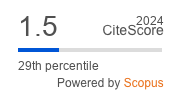Exploring Subjective Sleepiness with UnnCyberpsy, a Web-Based Psychophysiological Research Tool
DOI:
https://doi.org/10.5753/jis.2024.3900Keywords:
Web-Application, Psychophysiological Research, Subjective SleepinessAbstract
The foundation of scientific research lies in robust data collection methodologies, increasingly embracing a data-driven paradigm within the realm of psychological studies. This paper outlines our extensive undertaking of a psychophysiological investigation utilizing the web-based platform UnnCyberpsy for seamless data aggregation and processing. Data collection stands as a pivotal phase in scientific inquiry, with an increasing inclination toward data-centric methodologies within psychological research. This study delineates our endeavor in conducting a comprehensive psychophysiological investigation employing the web-based tool UnnCyberpsy for data acquisition and analysis. Constructed within the PHP programming framework and 'CodeIgniter' microframework (version 4.0), UnnCyberpsy offers pivotal functionalities, including scheduling equipment pick-ups, guiding through test procedures using a branched algorithm, and handling data storage and preprocessing. Each test phase is pre-coded into the system, empowering participants to independently undergo the testing regimen via personal devices. Automatic data collection, preprocessing, and storage streamline the process, ensuring comprehensive participant data validation and preservation upon experiment completion. Embracing UnnCyberpsy resulted in an elimination of data loss risk to 0%, a 30% rise in potential participant engagement, and expedited data gathering constrained solely by participant numbers and equipment availability. Our exploration underscores the pivotal role of online applications like UnnCyberpsy, not only streamlining data collection but also fostering a symbiotic environment benefiting both researchers and participants. This paradigm shift towards digital platforms stands as a beacon for future research endeavors, promising unparalleled convenience and efficiency in the realm of data-driven scientific inquiry.
Downloads
References
Abrahamsen, A., Weihe, P., Debes, F., and van Leeuwen, W. M. (2022). Sleep, sleepiness, and fatigue on board faroese fishing vessels. Nature and science of sleep, pages 347–362. DOI: https://doi.org/10.2147/NSS.S342410.
Alavi, C. B. and Massman, J. D. (2016). Selecting an electronic data capture system. Urology practice, 3(3):236–241. DOI: https://doi.org/10.1016/j.urpr.2015.06.007.
Bizzego, A., Mina, M., Zarbo, C., Esposito, G., and Furlanello, C. (2014). Physiolyze: a galaxy-based web service for heart rate variability analysis with online processing. In 2014 8th Conference of the European Study Group on Cardiovascular Oscillations (ESGCO), pages 97–98. IEEE. DOI: https://doi.org/10.1109/ESGCO.2014.6847537.
Canino, G., Scarpino, M., Cristiano, F., Mirarchi, D., Tradigo, G., Guzzi, P. H., Cuda, G., and Veltri, P. (2016). Geoblood: a web based tool for geo-analysis of biological data. Procedia Computer Science, 98:473–478. DOI: https://doi.org/10.1016/j.procs.2016.09.077.
Casale, C. E., Yamazaki, E. M., Brieva, T. E., Antler, C. A., and Goel, N. (2022). Raw scores on subjective sleepiness, fatigue, and vigor metrics consistently define resilience and vulnerability to sleep loss. Sleep, 45(1):zsab228. DOI: https://doi.org/10.1093/sleep/zsab228.
Clark, I. and Landolt, H. P. (2017). Coffee, caffeine, and sleep: A systematic review of epidemiological studies and randomized controlled trials. Sleep medicine reviews, 31:70–78. DOI: https://doi.org/10.1016/j.smrv.2016.01.006.
Demareva, V., Viakhireva, V., Demarev, A., and Nazarov, N. (2024). ‘unncyberpsy’: A web-application for psychophysiological research of subjective sleepiness dynamics. In Digital Geography: Proceedings of the International Conference on Internet and Modern Society (IMS 2023). Springer.
Demareva, V., Viakhireva, V., Zayceva, I., Isakova, I., Okhrimchuk, Y., Zueva, K., Demarev, A., Nazarov, N., and Edeleva, J. (2023). Temporal dynamics of subjective sleepiness: A convergence analysis of two scales. Biological Rhythm Research, 54(4):369–384. DOI: https://doi.org/10.1080/09291016.2023.2193791.
Hanbury, M. M., Sadeghi, B., Tseregounis, I. E., Gomez-Camacho, R., Manzo, R. D., Rangel, M. I., Alexandrescu, B., and de la Torre, A. (2019). A web-based application to improve data collection in an interventional study targeting childhood obesity: pre-post analysis. Journal of Medical Internet Research, 21(1):e10861. DOI: https://doi.org/10.2196/10861.
Jabbar, R., Al-Khalifa, K., Kharbeche, M., Alhajyaseen, W., Jafari, M., and Jiang, S. (2018). Real-time driver drowsiness detection for android application using deep neural networks techniques. Procedia computer science, 130:400–407. DOI: https://doi.org/10.1016/j.procs.2018.04.060.
Mohana, B. and Rani, C. S. (2019). Drowsiness detection based on eye closure and yawning detection. International Journal of Recent Technology and Engineering, 8(4):8941–8944. DOI: http://doi.org/10.35940/ijrte.D9716.118419.
Nielsen, J. (1999). User interface directions for the web. Communications of the ACM, 42:65–72. DOI: https://doi.org/10.1145/291469.291470.
Phan, A.-C., Trieu, T.-N., and Phan, T.-C. (2023). Driver drowsiness detection and smart alerting using deep learning and iot. Internet of Things, 22:100705. DOI: https://doi.org/10.1016/j.iot.2023.100705.
Reichert, C. F., Deboer, T., and Landolt, H.-P. (2022). Adenosine, caffeine, and sleep–wake regulation: state of the science and perspectives. Journal of sleep research, 31(4):e13597. DOI: https://doi.org/10.1111/jsr.13597.
Sanchez-Ortuno, M., Moore, N., Taillard, J., Valtat, C., Leger, D., Bioulac, B., and Philip, P. (2005). Sleep duration and caffeine consumption in a french middle-aged working population. Sleep medicine, 6(3):247–251. DOI: https://doi.org/10.1016/j.sleep.2004.10.005.
Smith, S. S., Horswill, M. S., Chambers, B., and Wetton, M. (2009). Hazard perception in novice and experienced drivers: The effects of sleepiness. Accident Analysis & Prevention, 41(4):729–733. DOI: https://doi.org/10.1016/j.aap.2009.03.016.
Thukral, R. and Goel, A. (2012). Web service interface for data collection. International Journal of Computer Science, 9(3):525–530.
Wong, J. Y. and Lau, P. Y. (2019). Real-time driver alert system using raspberry pi. ECTI Transactions on Electrical Engineering, Electronics, and Communications, 17(2):193–203. DOI: https://doi.org/10.37936/ecti-eec.2019172.215488.
Zhang, J., Sun, L., Liu, Y., Wang, H., Sun, N., and Zhang, P. (2017). Mobile device–based electronic data capture system used in a clinical randomized controlled trial: Advantages and challenges. Journal of Medical Internet Research, 19(3):e66. DOI: https://doi.org/10.2196/jmir.6978.
Downloads
Published
How to Cite
Issue
Section
License
Copyright (c) 2024 Valeriia Demareva, Valeriia Viakhireva, Irina Zayceva, Andrey Demarev, Nicolay Nazarov

This work is licensed under a Creative Commons Attribution 4.0 International License.
JIS is free of charge for authors and readers, and all papers published by JIS follow the Creative Commons Attribution 4.0 International (CC BY 4.0) license.








